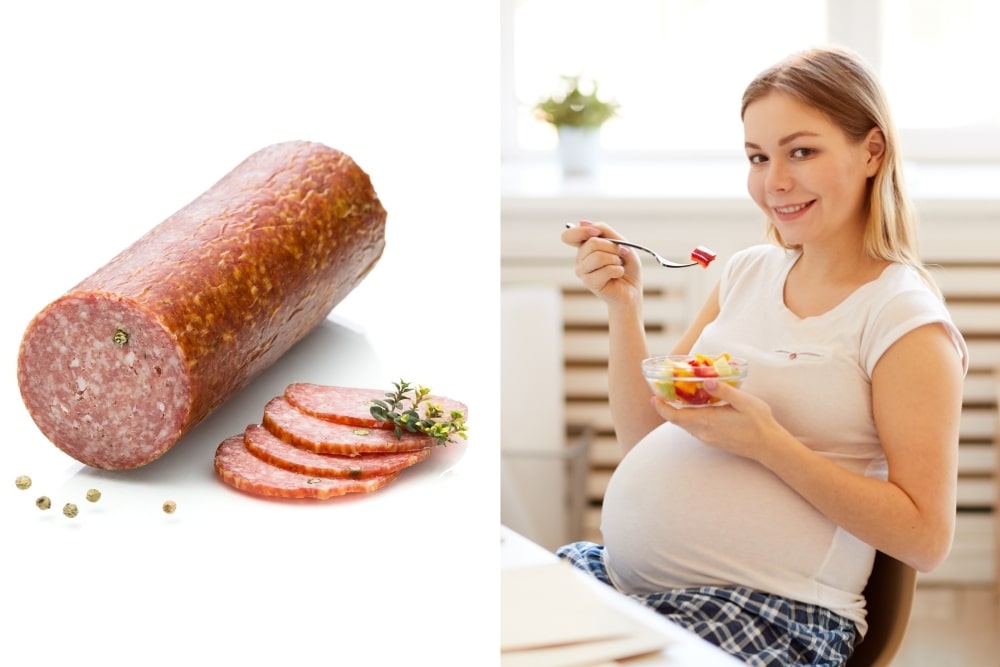Sausage is a ubiquitous food popular for its spicy taste and crumbly texture. While people love it, it’s also a highly processed food rich in saturated fat, sodium, and nitrosamines. So, is eating sausage during pregnancy a safe option? The answer is yes, you can safely enjoy sausage when you are pregnant. That said, there are some food rules you need to follow to make sure you and your baby don’t get sick.
Table of Contents
Can Pregnant Women Eat Sausage?
Yes, sausages are safe to eat during pregnancy. But like any other meat, you have to cook it at the right temperature and at the right time so that the meat is cooked to the core and there is no juice in it. However, as mentioned earlier, consuming it is safe, but not the healthiest option, as it may lead to some unwanted pregnancy complications. Therefore, it is recommended that you consult your doctor before incorporating it into your pregnancy diet.
Types Of Sausages: What Is Safe And What Is Not
Sausages are made from ground red meat or poultry and have a casing made from animal intestines. They can be fried, grilled, or grilled.
Processed meat products come in both raw and ready-to-eat forms. Fresh and smoked sausages are eaten raw, while dried, semi-dried, and cooked sausages are edible. Find out if you can eat each food
1. Fresh sausage
Fresh sausages are chopped meat particles, usually cured and seasoned. The assortment includes fresh pork sausage, fresh beef sausage, breakfast sausage, whole pig sausage, and Italian sausage products.
Safety during pregnancy: Fresh sausage is safe to eat if you refrigerate it properly and cook it thoroughly. Undercooked sausage may contain Listeria and is therefore not safe to eat.
2. Cooked sausage and/or smoked sausage
Boiled or smoked sausages are made from minced or ground meat. They are seasoned, cooked, and/or smoked. This category includes liver sausages, hot dogs, bologna, cooked sausages, Brunswick, cooked Thuringia, and salami.
Safety during pregnancy: Do not eat seasoned sausage unless it is fully cooked and piping hot.
3. Dry and semi-dried sausages
Dried and semi-dried sausages are cured with salt and sodium nitrite, cultured, mixed with the ground or chopped meat, placed in casings, fermented, and then dried. Semi-dried sausages are partially dry. Spicy sausages, Lebanese bologna, and summer sausages all belong to this variety.
Safety during pregnancy: The fermentation process and lack of moisture often kill pathogenic bacteria in dried sausages. However, it is best to avoid dry sausage while pregnant, as several bacteria, such as E. coli, can survive dry fermentation.
Benefits of Eating Sausage During Pregnancy
Sausage is known to contain amino acids, which contain high-quality protein, making it a healthy choice overall. It is also a rich source of vitamins, especially vitamin B12. Another key element found in high amounts of sausages is iron. This further complements keeping the level of hemoglobin in the blood at an optimal level, thereby preventing the occurrence of anemia.
Side Effects of Consuming Sausage While Pregnant

- 1. Preterm birth or miscarriage
Eating sausage during pregnancy can increase your risk of listeria. Listeria is a special type of bacteria that can affect pregnancy, leading to premature birth, miscarriage, and, in the worst cases, stillbirth.
- 2. Higher chance of contracting other diseases
The symptoms of Salmonella infection are severe. Complications such as nausea, severe stomach pain, diarrhea, vomiting, and frequent dehydration may also occur if you eat sausage during pregnancy and contract salmonella. This may further exacerbate high fever and body aches. Another parasite that causes toxoplasmosis can cause premature birth, jaundice, and maternal cramps.
- 3. Heartburn
Eating a lot of spicy sausages can cause heartburn and you may lose sleep.
- 4. Pregnancy complications
Microbes in meat have a high chance of surviving, which can lead to unintended pregnancy complications. Therefore, it is recommended that you cook it properly before incorporating it into your pregnancy diet and avoid any complications.
- 5. Increased sodium and fat levels in the body
Nearly 27% of sausage is made up of fat, of which 10% is made up of saturated fat. Likewise, 1.2% of sausage consists of sodium. Eating too much sausage can increase sodium and fat levels in the body and lead to unwanted complications.
7 Safety Tips To Eat Sausages
Food cravings during pregnancy can blind you to reason, but they can also lead to guilt after you’ve indulged in them. Here are some tips so you don’t feel guilty eating sausage:
- Eat the sausage while it’s hot. If you eat out, ask the supplier to reheat it for you.
- Don’t eat undercooked sausage.
- Refrigerate the leftover sausage and eat it within two days, but it must be reheated to steaming hot
- Even if you buy pre-cooked sausages, reheat them before eating them.
- Keep raw meat away from cooked food to make sure the juices from the raw meat don’t drip into other foods.
- Check labels for raw and ready-to-eat sausages.
- Choose foods that are low in sodium and flavors.
Final Words
Sausages are eaten to satisfy appetite during pregnancy but do not provide any health benefits. Choose healthy alternatives to traditional sausage toppings. Adding fresh vegetables, herbs, whole grains like barley and homemade sauces that are limited in sodium can help you make healthy sausages.

